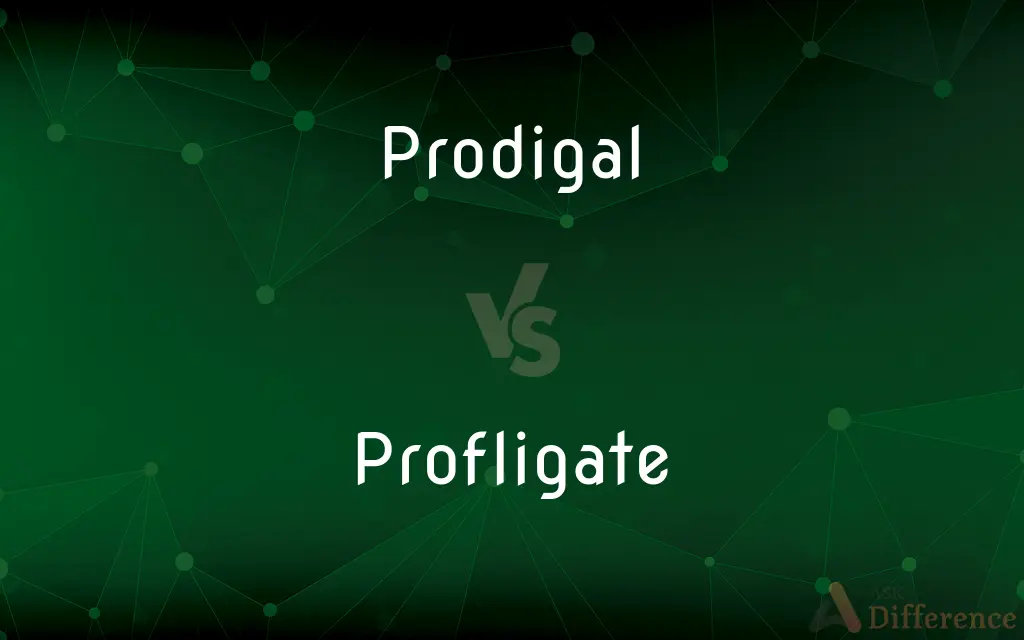Prodigal vs. Profligate — What's the Difference?
By Tayyaba Rehman & Maham Liaqat — Updated on April 21, 2024
Prodigal refers to wastefully extravagant spending, while profligate emphasizes reckless dissipation of resources through immoral or debauched behaviors.

Difference Between Prodigal and Profligate
Table of Contents
ADVERTISEMENT
Key Differences
The term prodigal is often used in a somewhat sympathetic or redemptive context, particularly in literary or religious narratives, as seen in the Biblical parable of the Prodigal Son, who returns home to seek forgiveness. On the other hand, profligate is typically used in a more condemnatory manner, implying not just waste but also a corrupt or degenerate behavior.
Prodigal can sometimes carry a neutral or even positive connotation when it highlights generosity or lavishness without the negative consequences of total ruin. Whereas profligate almost invariably carries a negative connotation, stressing harmful excesses and the absence of discipline.
In terms of recovery, someone described as prodigal might be seen as capable of reform or returning to more prudent ways. Profligate, however, suggests a more ingrained pattern of behavior, often resistant to change, highlighting a deep-seated disregard for normative social or moral standards.
When referring to non-human subjects, such as 'prodigal nature' or 'prodigal creativity', the term suggests lavish or abundant qualities. In contrast, 'profligate spending' or 'profligate waste' emphasizes destructive and unsustainable practices, often linked to environmental or economic critique.
Comparison Chart
Definition
Spending money or using resources freely and recklessly
Recklessly wasteful, especially in a moral sense
ADVERTISEMENT
Connotation
Often negative, but can be neutral or positive
Almost always negative
Associated Behaviors
Wasteful spending, but possibly redeemable
Wasteful and morally degenerate behaviors
Literary Usage
Sometimes sympathetic, redemptive
Condemnatory, degenerate
Non-human Usage
Can describe generosity or abundance
Focuses on destructive excesses
Compare with Definitions
Prodigal
Returning after wastefulness.
The prodigal son came back to his father's welcome.
Profligate
Recklessly extravagant.
He was known as a profligate spender with little regard for his future.
Prodigal
Extravagantly wasteful.
The prodigal prince spent his inheritance within a year.
Profligate
Irresponsible in use of resources.
The company's profligate use of water was criticized amid the drought.
Prodigal
Generously lavish.
The feast was prodigal, leaving nothing to be desired.
Profligate
Wasteful, especially of money or morals.
Profligate habits led to both financial and personal ruin.
Prodigal
Abundantly productive.
The prodigal fields yielded twice the expected harvest.
Profligate
Debauched or dissipated.
The novel portrays a profligate nobleman in a decaying society.
Prodigal
Recklessly extravagant.
His prodigal lifestyle led to his financial downfall.
Profligate
Morally corrupt.
His profligate behavior scandalized the community.
Prodigal
Spending money or using resources freely and recklessly; wastefully extravagant
Prodigal habits die hard
Profligate
Recklessly extravagant or wasteful in the use of resources
Profligate consumers of energy
Prodigal
Having or giving something on a lavish scale
The dessert was prodigal with whipped cream
Profligate
Licentious; dissolute
He succumbed to drink and a profligate lifestyle
Prodigal
A person who spends money in a recklessly extravagant way
The government wished to clip the wings of the local authority prodigals
Profligate
A licentious, dissolute person
He is a drunkard and a profligate
Prodigal
Rashly or wastefully extravagant
Prodigal expenditures on unneeded weaponry.
A prodigal nephew who squandered his inheritance.
Profligate
Given to or characterized by licentiousness or dissipation
A profligate nightlife.
Prodigal
Giving or given in abundance; lavish or profuse
"the infinite number of organic beings with which the sea of the tropics, so prodigal of life, teems" (Charles Darwin).
Profligate
Given to or characterized by reckless waste; wildly extravagant
A profligate spender.
The profligate use of water.
Prodigal
One who is given to wasteful luxury or extravagance.
Profligate
A profligate person.
Prodigal
Wastefully extravagant.
He found himself guilty of prodigal spending during the holidays.
The prodigal son spent his share of his inheritance until he was destitute.
Profligate
Inclined to waste resources or behave extravagantly.
Prodigal
Yielding profusely, lavish.
She was a merry person, glad and prodigal of smiles.
How can he be so prodigal with money on such a tight budget?
Profligate
Immoral; abandoned to vice.
Prodigal
Profuse, lavishly abundant.
Profligate
(obsolete) Overthrown, ruined.
Prodigal
(by allusion to the New Testament story commonly called "The Parable of the Prodigal Son", [http://www.biblegateway.com/passage/?search=Luke+15:11–32 Luke 15:11–32]) Behaving as a prodigal son:
Profligate
An abandoned person; one openly and shamelessly vicious; a dissolute person.
Prodigal
Having (selfishly) abandoned a person, group, or ideal.
Profligate
An overly wasteful or extravagant individual.
Prodigal
Returning or having returned, especially repentantly, after such an abandonment.
Profligate
(obsolete) To drive away; to overcome.
Prodigal
A prodigal person; a spendthrift; a wastrel.
Profligate
Overthrown; beaten; conquered.
The foe is profligate, and run.
Prodigal
Given to extravagant expenditure; expending money or other things without necessity; recklessly or viciously profuse; lavish; wasteful; not frugal or economical; as, a prodigal man; the prodigal son; prodigal giving; prodigal expenses.
In fighting fields [patriots] were prodigal of blood.
Profligate
Broken down in respect of rectitude, principle, virtue, or decency; openly and shamelessly immoral or vicious; dissolute; as, profligate man or wretch.
A race more profligate than we.
Made prostitute and profligate muse.
Prodigal
One who expends money extravagantly, viciously, or without necessity; one that is profuse or lavish in any expenditure; a waster; a spendthrift.
Profligate
An abandoned person; one openly and shamelessly vicious; a dissolute person.
Prodigal
A recklessly extravagant consumer
Profligate
To drive away; to overcome.
Prodigal
Very generous;
Distributed gifts with a lavish hand
The critics were lavish in their praise
A munificent gift
His father gave him a half-dollar and his mother a quarter and he thought them munificent
Prodigal praise
Unsparing generosity
His unstinted devotion
Called for unstinting aid to Britain
Profligate
A dissolute man in fashionable society
Prodigal
Recklessly wasteful;
Prodigal in their expenditures
Profligate
A recklessly extravagant consumer
Prodigal
Marked by rash extravagance;
Led a prodigal life
Profligate
Recklessly wasteful;
Prodigal in their expenditures
Profligate
Unrestrained by convention or morality;
Congreve draws a debauched aristocratic society
Deplorably dissipated and degraded
Riotous living
Fast women
Common Curiosities
What does profligate mean?
Profligate refers to someone who is recklessly extravagant, often with a negative moral connotation.
Is profligate used only in financial contexts?
No, profligate can also imply moral corruption and irresponsible behavior beyond just financial wastefulness.
What does prodigal mean?
Prodigal means spending money or resources freely and recklessly.
Can prodigal have a positive connotation?
Yes, prodigal can be positive when it refers to lavish generosity or abundance without ruinous outcomes.
Can organizations be described as profligate?
Yes, organizations can be called profligate if they use resources wastefully and irresponsibly, especially in a way that implies moral failings.
What is the origin of the word profligate?
It derives from the Latin "profligatus", meaning to overthrow or ruin.
Can prodigal be used in a non-financial context?
Yes, it can describe anything done lavishly and abundantly, not just financial spending.
How should one use prodigal in a sentence?
One could say, "The prodigal artist used his entire grant on a single, extravagant project."
How are prodigal and profligate similar?
Both terms imply a level of recklessness and extravagance in usage of resources.
How are prodigal and profligate different?
Prodigal often has a less severe connotation and may imply a possibility of redemption, unlike profligate which is harsher and often involves moral corruption.
What is the origin of the word prodigal?
It comes from the Latin word "prodigus", meaning lavish.
Why might someone be called prodigal?
Due to their extravagant spending that leads to wastefulness, though they might still return or reform.
Why might someone be called profligate?
Due to their extreme wastefulness coupled with immoral or unethical behavior.
How should one use profligate in a sentence?
One might say, "The profligate heir wasted his fortune on gambling and luxury."
Can profligate refer to good behavior?
No, profligate almost always has negative implications, especially involving wasteful and immoral actions.
Share Your Discovery

Previous Comparison
Anticipate vs. Foresee
Next Comparison
Goyim vs. GoyAuthor Spotlight
Written by
Tayyaba RehmanTayyaba Rehman is a distinguished writer, currently serving as a primary contributor to askdifference.com. As a researcher in semantics and etymology, Tayyaba's passion for the complexity of languages and their distinctions has found a perfect home on the platform. Tayyaba delves into the intricacies of language, distinguishing between commonly confused words and phrases, thereby providing clarity for readers worldwide.
Co-written by
Maham Liaqat













































